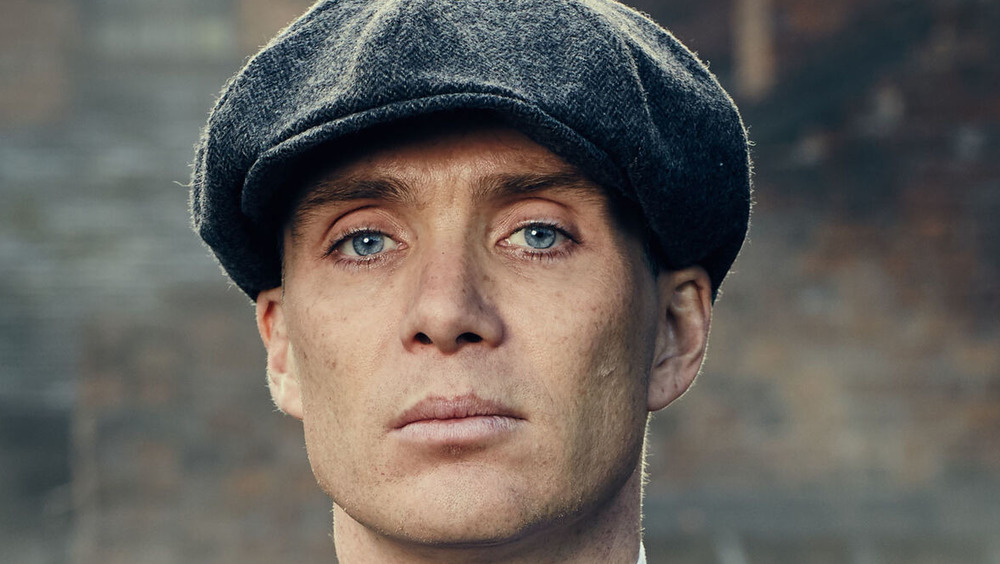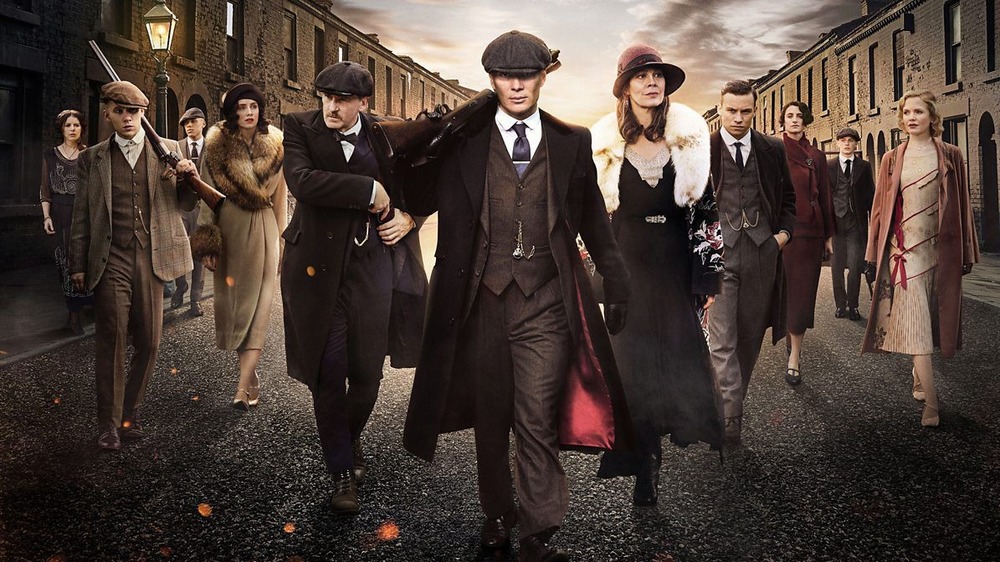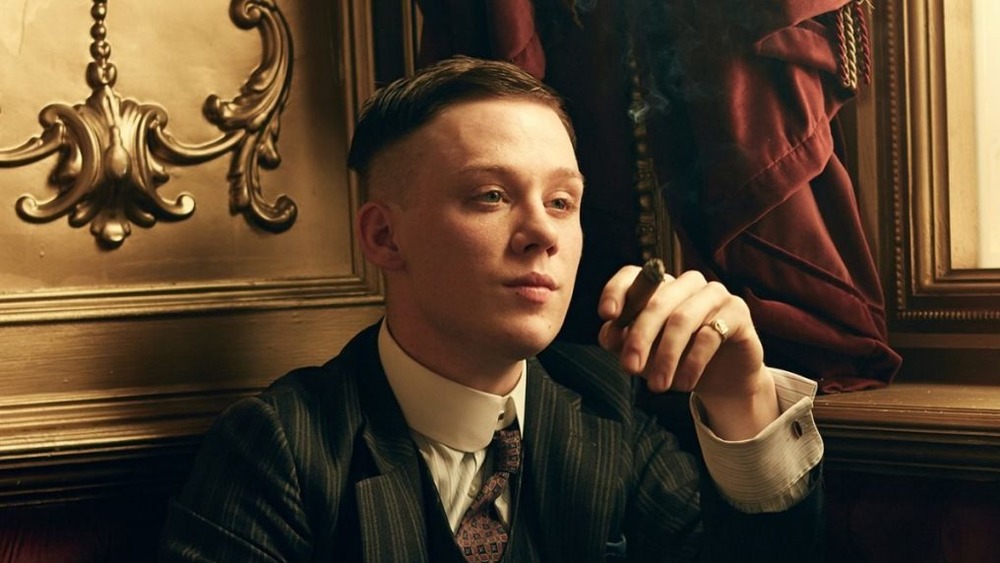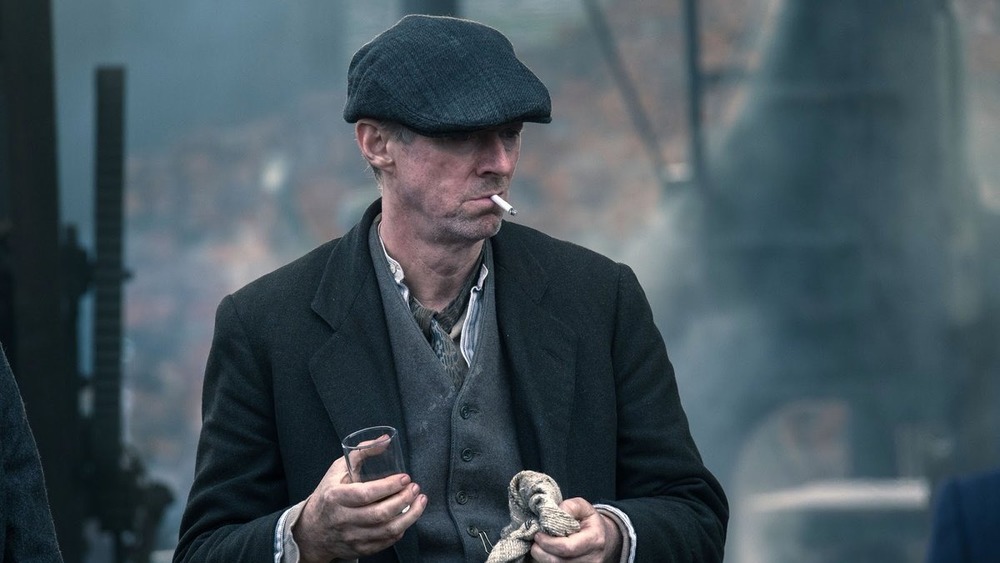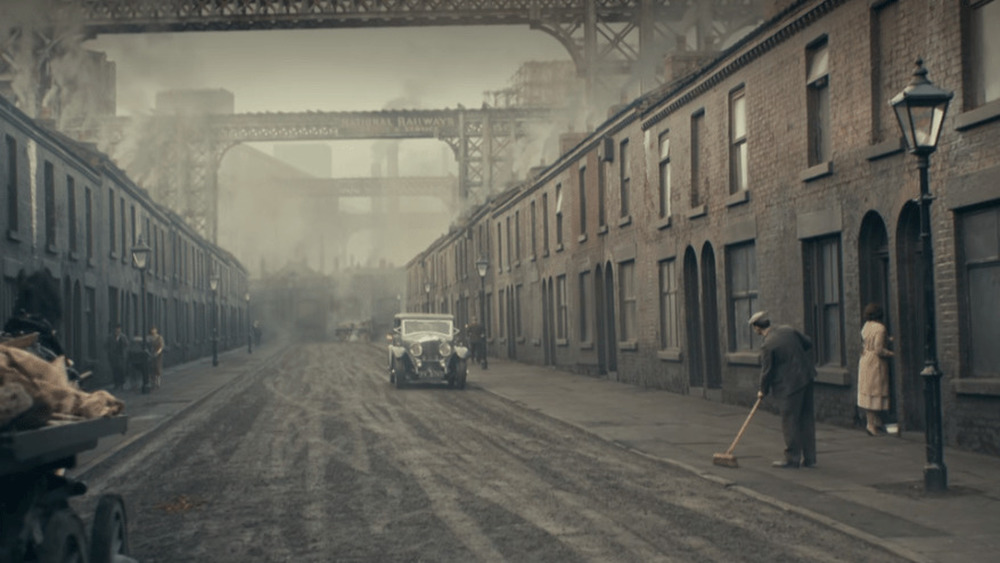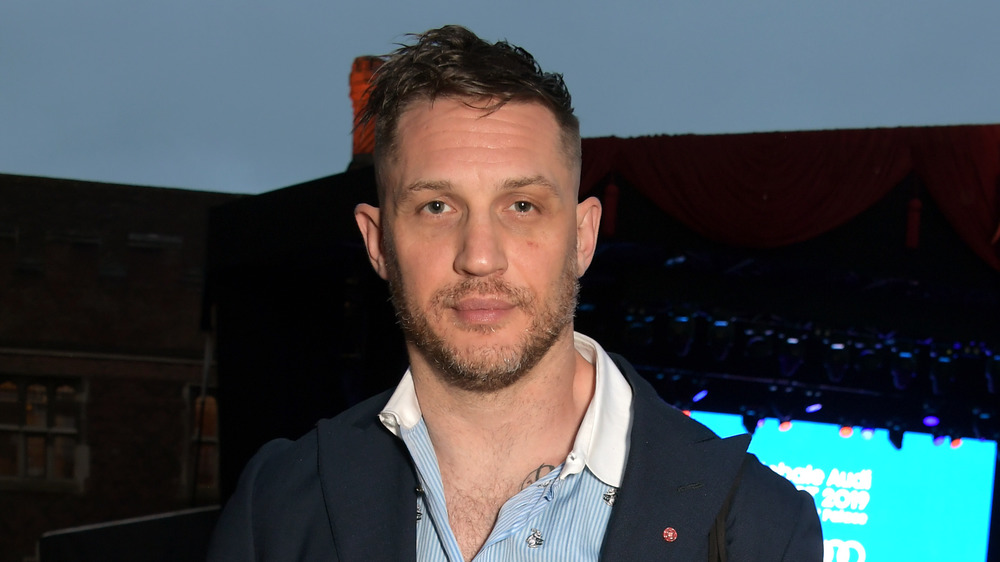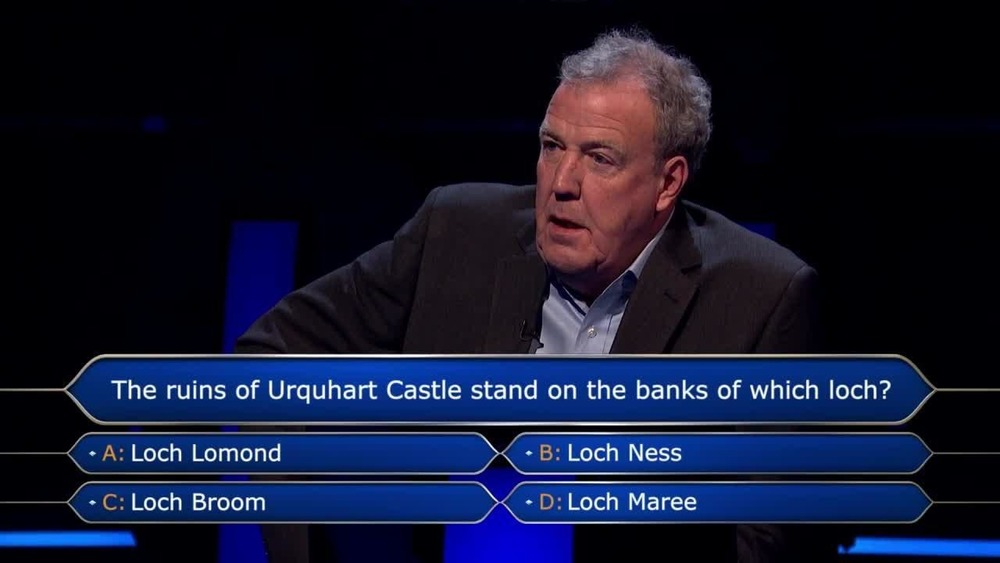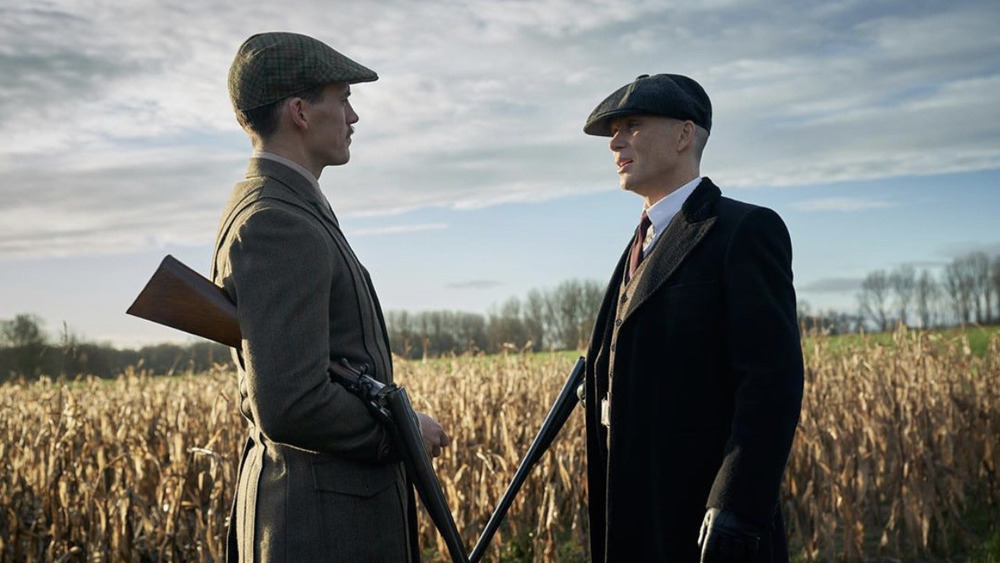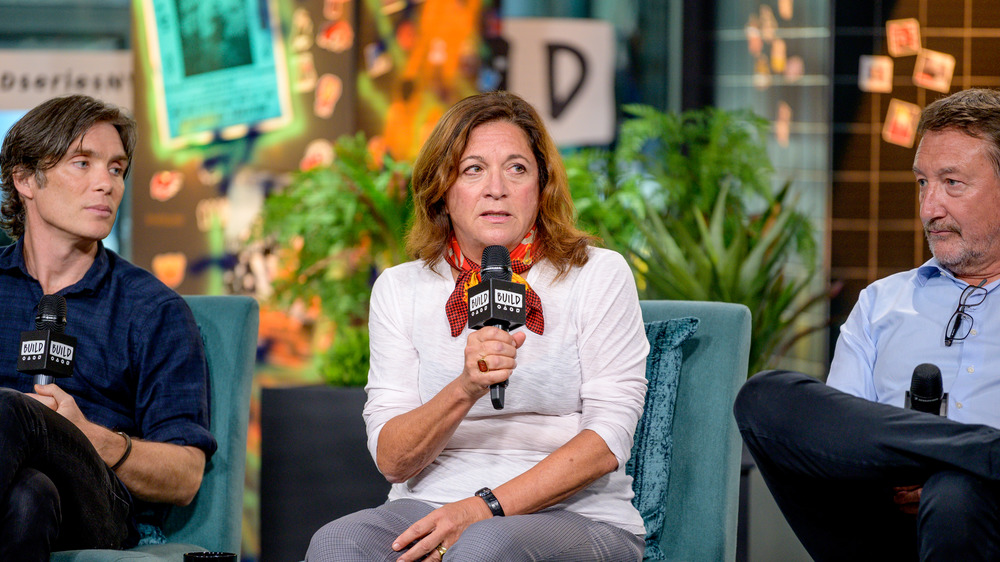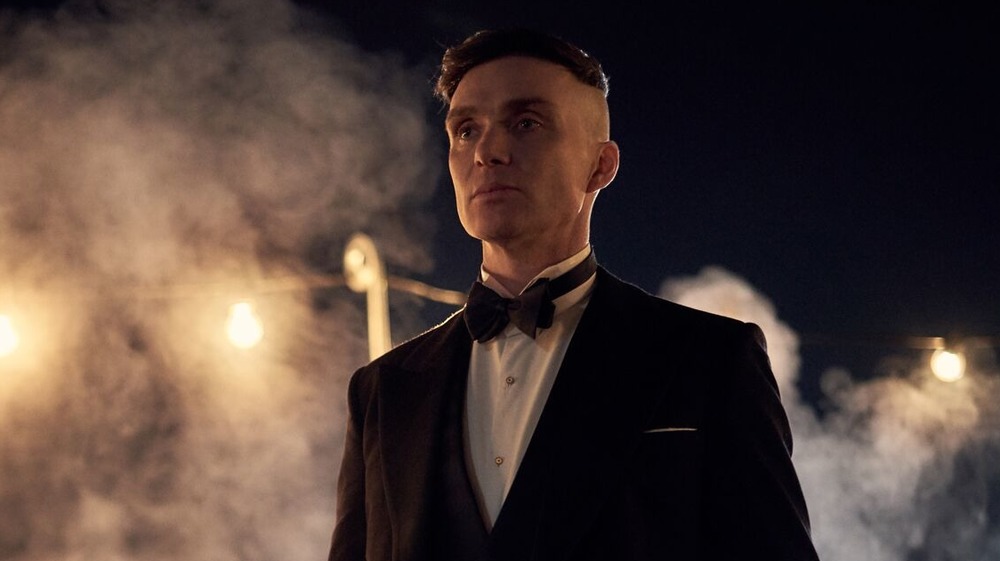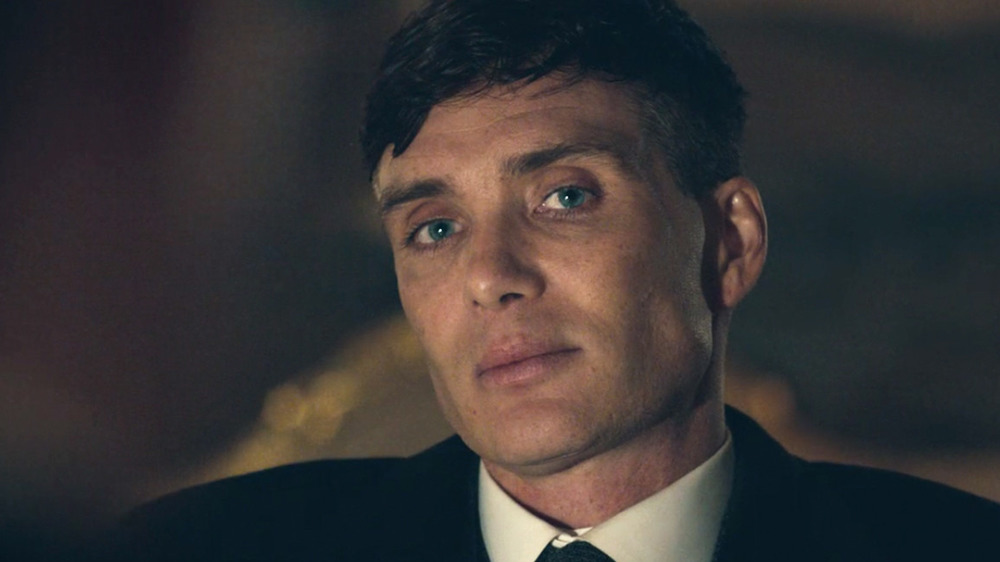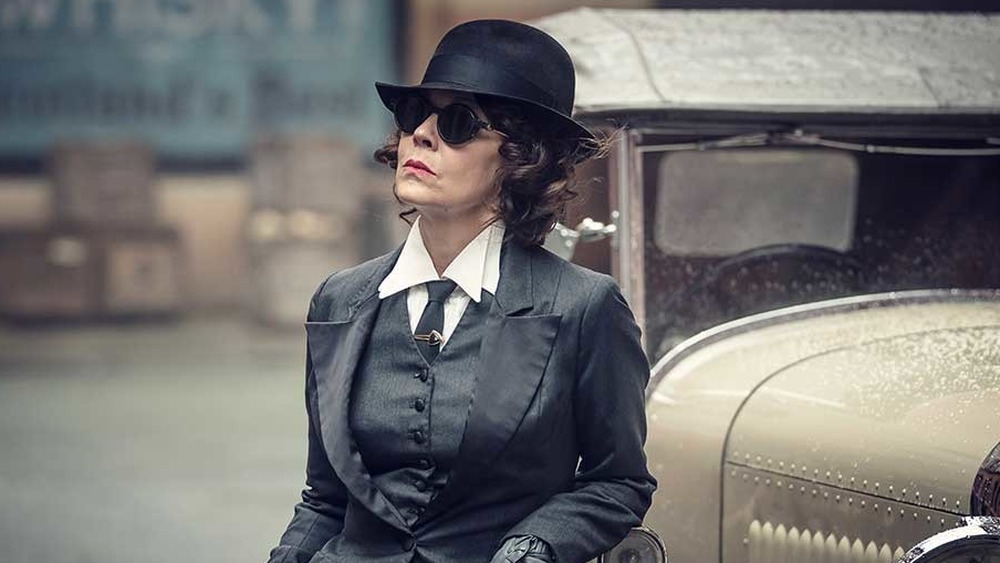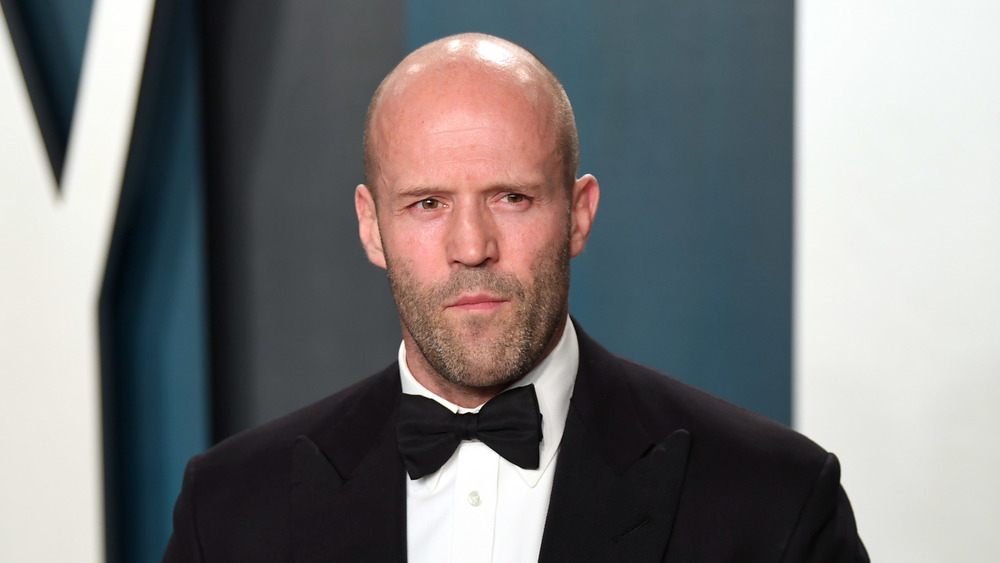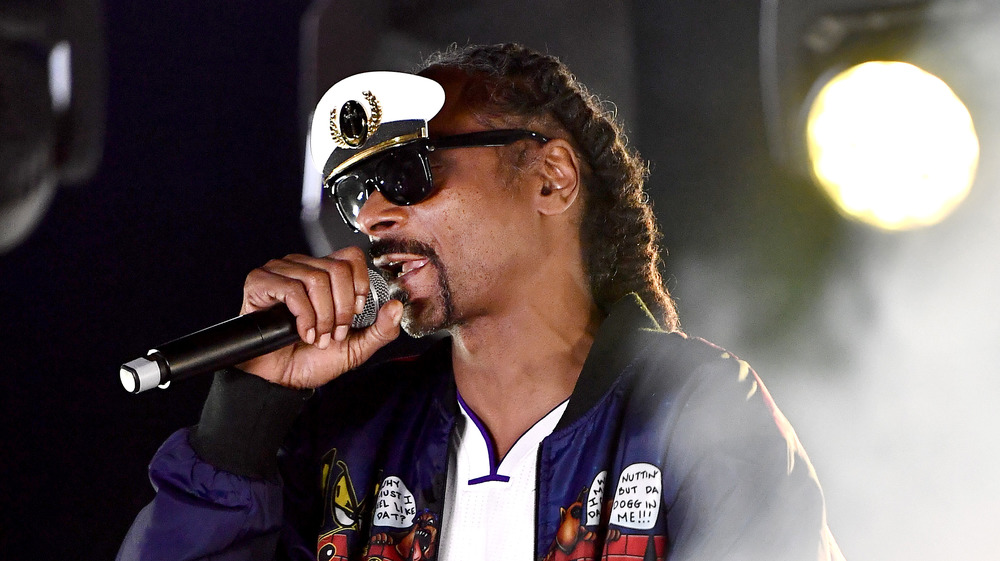The Untold Truth Of Peaky Blinders
Out of the smoke of coal fires and the fog of the river prowl the menacing silhouettes of men wearing finely-tailored suits and newsboy caps. The Peaky Blinders were little more than Birmingham street toughs in real life, but in Steven Knight's brilliant series, their story is elevated to myth. Peaky Blinders is the story of a gang — more specifically, the family that runs the gang. Even more specifically, it's about the man who leads that gang, as its members fight their way up from petty criminals to wealthy political players on the national stage.
Filming season six, which is the show's last, was delayed, meaning fans got to hold onto the series a little longer. Knight has promised, though, that the story will continue — perhaps as a Peaky Blinders movie viewers can look forward to. For now, fans can revisit the show they love, play the Peaky Blinders video game, and enjoy this list of the lesser-known details, origins, and truths of the show they love so much. This is everything you never knew about Peaky Blinders.
The Peaky Blinders were a real Birmingham gang
The real Peaky Blinders ran the streets of Birmingham, though a little before the time depicted in the BBC series. According to Smithsonian Magazine, the real Peaky Blinders (who were likely named because of their distinctive hats) were big from the 1890s until about WWI. In contrast, Peaky Blinders is set in the post-World War I 1920s. The real-world Blinders were also less criminal masterminds than thugs, more focused on knocking over lorries than taking over horse racing and joining parliament. They were replaced by the Birmingham Boys, run by legendary crime boss Billy Kimber (a Shelby enemy in season one of the series) in the 1920s. The Boys, in turn, were replaced by Charles Sabini's gang (a Shelby enemy in season two) in the 1930s.
As for the family name, series creator Steven Knight told BBC History Magazine that it stems from a tale his father told him. In his youth, Knight's father was told by Knight's grandfather to "go and deliver [a message] to your uncles." These were the Sheldons, who were then part of the last remnants of the Peaky Blinders. Their name became the Shelbys for the series, possibly to prevent any razor-blade-hat attacks against Knight in retribution.
The iconic Peaky Blinders haircut was inspired by lice prevention
According to Laura Schiavo, hair and makeup designer for Peaky Blinders from day one, the Peakies' look was a regular one for working class men of the time looking to prevent lice. This was also likely influenced by their time in the trenches of WWI, where lice thrived in the close conditions.
Schiavo didn't just want to shave the actors' heads for Peaky Blinders, however. Instead, she wanted to incorporate their signature caps as a characterization device. When they're walking as a gang, they look like soldiers with their heads uniformly shaved. But when they take their caps off, their individual personalities show through. Nowadays, the haircut worn by Cillian Murphy's Tommy Shelby is a popular style, though Murphy was, at first, "alarmed" by the haircut.
Basically, all the hipsters from London to LA who've adopted this new trend get to enjoy a surprising perk: They don't have to worry about lice, as long as they wash their hats!
Creator Steven Knight is the son of a Birmingham blacksmith
Steven Knight has basically been researching the Peaky Blinders his whole life. When Steven was a baby, his father, a rural horse-shoeing blacksmith named George Knight, moved the family to Small Heath in southeast Birmingham, where George had grown up as the son of a canal boatman. True to his hard-scrabble working class roots, George worked with his brothers in the local car factories. But eventually, he was able to get a mobile forge and start shoeing horses again, this time taking young Steven with him. Apparently, there were horse stables and scrap yards in the city where the Knights were regulars. "I used to go in there as a kid and you would see the Peaky Blinders world," said Knight. He continued, "As my dad shoed the horses, I'd hear them talking ... It was that flavour of the last of the old Birmingham that I tried to put into Peaky."
One of Knight's real "uncles" was Charlie Strong, who Knight brought to life as one of Tom Shelby's confidantes.
None of it is actually shot in Birmingham
Peaky Blinders is a story about Birmingham with more grit and personality than could be replicated on a sound stage. But despite that textured realism, none of it is actually filmed in Birmingham. According to Conde Nast Traveler, most of the streets of Birmingham seen in the first few seasons especially were actually filmed in Manchester, a win for Birmingham's rival for the spot of England's second city. A lot is also filmed in Yorkshire (where, ironically, a very different BBC series, Downton Abbey, is set), Liverpool, and Lancashire. As it turns out, even the London scenes weren't shot in London.
The closest we get to actual Birmingham is the Black Country Living Museum in Dudley, in the West Midlands. With a bunch of renovated industrial buildings and a Canal Arm, this museum has provided plenty of boat dock, blacksmith's forge, and metal yard shots.
Knight is looking to change this state of affairs, however. As of 2020, the talk of the town has been of Knight's plans to open "Brummiewood," a massive media village with TV and film studios, as well as houses, bars, and restaurants, right in Birmingham.
Tom Hardy has worked with much of the Peaky Blinders cast and crew before
Peaky Blinders fans were excited when it was announced that Tom Hardy was joining season two. His Alfie Solomons has become a fan favorite character, as shown by the huge response to the reveal that he was being brought back in season five. Undoubtedly, part of the reason he slipped into the team so well is that he's worked with Knight and casting director Shaheen Baig before, on the film Locke.
Hardy also starred in and co-produced Taboo with Knight, which was planned before Peaky Blinders, as Knight explained in an interview with Deadline. And that's not the end of Hardy's long history with Peaky's cast and crew. Hardy starred as Bane in The Dark Knight Rises alongside Cillian Murphy, reprising his role as the Scarecrow. That was the second of three movies directed by British-American powerhouse Christopher Nolan that include the two actors, the others being Inception and Dunkirk. Hardy would go on to work alongside Paul Anderson, who plays Arthur Shelby, in The Revenant, though this occurred after Hardy had already joined the cast of Peaky.
As Knight said about Hardy in the Deadline interview, "I am someone who thinks that if you've got an actor like that who wants to perform your work, then you should do it, and hopefully Tom likes to do the work that I do." Apparently, he does!
Steven Knight's first international hit was Who Wants to be a Millionaire
Steven Knight first started writing for British TV in 1989. His screenplay for 2004's Dirty Pretty Things received a Best Original Screenplay Oscar nomination. But his first real international breakthrough was the 1998 game show, Who Wants to be a Millionaire?
Since then, Knight has added "playwright" to his list of occupations, directed several films, and written and produced several films and series including Peaky Blinders, Taboo, and See. Yet you can't read a bio or interview of the man that doesn't mention one simple fact: That he, one of England's current greatest creative talents, really did get his start creating a game show that has gone on to spawn many different versions in many different countries — not to mention the fact that it plays a central role in the Academy Award-winning film, Slumdog Millionaire.
That's a pretty wide reach for any writer, much less the son of a Birmingham blacksmith.
Oswald Mosley's real-world story
You've probably recognized a number of Peaky Blinders figures as actual people. Early in season one, we get a cameo from Winston Churchill. Charlie Chaplin makes an appearance. Historical currents and events are present as well: The rise of the IRA and communism is worked into the plot, and the American stock market crash makes a big splash in season five. However, one real-world Peaky Blinders character had a massive impact on the world in a way you might not know of. We're talking about Oswald Mosley.
MP Oswald Mosley is introduced in season five as a British fascist on his way up, foreshadowing the rise of the Nazis. This changes things up in a major way: In season five, Tommy Shelby takes on an adversary not for business purposes, but because he knows the man's message is wrong.
This choice came from a place of conviction for Steven Knight. "The rise of fascism, racism, national socialism and populism ... it's happening now. I looked at Mosley's speeches, and one of them began 'Do not believe false news,'" said Knight in an article with The Guardian. "He was telling people that the media was lying to them, that foreigners were taking things away from them. It's my good fortune — but the world's bad fortune — that these things are happening again and I can write about them."
Executive producer Caryn Mandabach made her career with American sitcoms
Peaky Blinders is produced in part by executive producer's Caryn Mandabach's own production company. But Caryn Mandabach didn't always produce gritty, drug-fueled, critically-acclaimed series about flawed heroes. In fact, she started at the other end of the spectrum: Mandabach built her name producing American sitcoms.
Mandabach made her bones on shows like The Cosby Show, Roseanne, That '70s Show, and more. In an interview with The Atlantic, she discussed how she was ready for a change from what was happening in American television, and moved to England to get back to independent TV production. Other than a year studying abroad, she didn't really have any connections to England. After producing a few series, she took on Peaky Blinders.
It might seem arbitrary, but as Mandabach said, "Like Steve Knight, I have a vague gangster background." As in, her Chicago-based father got on the mob's bad side to the point that he had to fake his own death and move to the Philippines. Which might make an interesting show itself, really. Maybe even a sitcom!
Peaky Blinders jumped up to the premiere BBC network
The BBC dominates British airwaves, to the point that it has eight TV channels in the UK. Moreover, as of 2018, 80 percent of all UK adults watch BBC television on a weekly basis. There are different focuses for each network, with BBC One being focused on current affairs and top shows, while BBC Two is known for having "factual programmes at the heart" of its offerings, and so on. Generally speaking, BBC One is the flagship, and the most-watched entertainment channel. Only the most high-profile shows are showcased on BBC One.
Peaky Blinders premiered on BBC Two in 2013. In 2014, its first two seasons landed on Netflix, garnering international fans, which may in turn have had an effect on British viewers: The fourth season of Peaky Blinders pulled in an audience of 3.3 million. And so, for season five, Peaky got moved up to BBC One. This is a big move. As Knight said, "I am thrilled that our precious Peaky Blinders is moving to BBC1. Peaky is a show nurtured and grown by the audience who have found us through word of mouth."
Netflix acquired Peaky Blinders as part of its rocket to the top
Netflix began in 1997. Back then, it was competing with a king called Blockbuster. In 2007, Netflix launched its online streaming "Watch Now" service, which initially only worked on PCs and Internet Explorer. In 2013, House of Cards, the first original Netflix series, made its debut. In a 2013 GQ article, Netflix's chief content officer Ted Sarandos said, "The goal is to become HBO faster than HBO can become us."
In 2014, Netflix doubled down with a commitment to spending $3 billion on TV and film content. This is arguably the year when Netflix moved from being a company people thought might fail to the giant we now know. In September 2014, Netflix used some of its treasure chest to acquire a certain British gangster period piece. In an LA Times article, Sarandos praised Peaky Blinders' "compelling storylines, powerful performances and stunningly beautiful imagery."
Those distribution rights were acquired from The Weinstein Company. After sexual abuse allegations against the company namesake first appeared in 2017, Peaky Blinders dropped the Weinstein Company logo faster than Tommy Shelby drops a sick horse.
Two Peaky Blinders tours and a festival
Do you want to learn about a crew of real Birmingham gangsters, or do you want to spend time in Tommy Shelby's footsteps, tracing the route he took to become one of the most powerful men in England? If it's the former, check out The Real Peaky Blinders Tour, which takes visitors walking through Birmingham's streets. You'll drink in pubs and learn about the blood that was once shed right beneath your very feet — as well as the real gangs that shed that blood.
If you're more interested in the latter option, there are several tours you might be interested in. The Peaky Blinders Full Day Tour takes tourists around Liverpool and "[works] in partnership with the creators of Peaky Blinders, Caryn Mandabach Productions and Tiger Aspect Productions." Notably, this tour includes a lengthy exploration of Tommy's mansion, including "a spot of lunch" in that lavish locale.
If tours aren't your thing, you can always go to the Legitimate Peaky Blinders Festival and dress up like your favorite character. The event was held in September 2019, but it hasn't happened since. Whether that is due to 2020 travel restrictions and COVID-19 related event cancellations remains to be seen.
Jason Statham was almost Thomas Shelby
Cillian Murphy's Thomas Shelby is chillingly perfect. He can go from country squire to savage factory-town thug with the drop of a razor-lined hat. It's tough to imagine anybody else playing such a dynamic character so well. Yet Jason Statham was in the running to play Shelby — and possibly in the lead. In a live watch-along put on by Esquire UK featuring Steven Knight, Knight said he met with both Jason Statham and Cillian Murphy in LA. "Physically in the room Jason is Jason," Knight remarked. "Cillian, when you meet him, isn't Tommy, obviously, but I was stupid enough not to understand that."
Before Peaky Blinders, Murphy was known for his roles in 28 Days Later, Christopher Nolan's Dark Knight trilogy, and Inception: He played an everyman in a crazy situation, a brilliant doctor who uses fear to commit crimes, and an extremely wealthy heir, respectively. Statham, meanwhile, has played toughs almost exclusively: His underground boxing promoter Turkish in Snatch would easily fit into the Peaky Blinders world. But apparently, after the meeting, Murphy texted Knight: "Remember, I'm an actor."
"Which is absolutely the thing," Knight affirmed, "because he can transform himself." Definitely an essential skill for a guy who has to portray the journey from being a shell-shocked street hustler to a member of the landed gentry.
Brad Pitt, Snoop Dogg, A$AP Rocky, David Bowie, and other Peakies
Peaky Blinders is obviously a very popular show — not only with average viewers, but also with celebrities. One notable fan is Brad Pitt, who has appeared in very few TV shows, but has played a British tough before in Snatch. When discussing famous people who have expressed interest in the series, Knight told The Guardian, "There's Brad Pitt. Snoop Dogg. A$AP Rocky, too. I think in series six we will open the door a little to get some celebrity actors in." Snoop Dogg in particular is such a fan, he did a version of the show's opening song, "Red Right Hand," introducing himself as "Snoop Shelby."
David Bowie was another huge fan of Peaky Blinders. Murphy even sent him a cap from the show, which Bowie sent Murphy a picture of himself wearing, complete with razor blades. According to Knight, Bowie expressed interest in providing music to the show. "Lazarus," a song from Bowie's final album, Blackstar, made it into season three.
